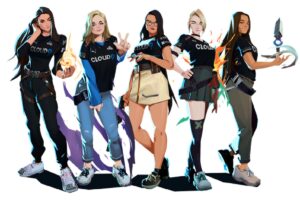Whether your only online gaming interaction is building a house once in Minecraft, or you regularly ruin your sleep schedule to game with friends, it is hard to deny the impact of gaming on today’s generation.
The pandemic marked a big year for electronic sports (also known as esports). Esports is a term that encapsulates the vast realm of organized multiplayer and independent video game competitions — either between teams or individual professional players. Online gaming and professional esports is a rapidly evolving space — women, notably, have been on the leading edge of the increasing popularity in esports.
While hindering teams’ revenue from in-person competition, online tournaments and the streaming of esports content saw a huge boost while traditional sports were sidelined due to lockdown restrictions forcing the world indoors.
“As gaming continues to surge in popularity and relevance for young people, we’ve seen more and more initiatives to make gaming and esports a more inclusive and less male-dominated space,” said Heather Garozzo, Vice President of Talent at Dignitas Esports.

art by Jander Gonzalez
In the past, many had perceived gaming as a male-dominated space that has historically failed to embrace inclusivity.
“I had very low expectations for an inclusive community when I first started watching esports,” said Yaya Harman ’22, who started following professional “Valorant,” a first-person shooter game developed by Riot Games. Riot Games is the publisher behind esports giant “League of Legends” released in 2009, as well as “Legends of Runeterra.”
“I had this very negative perception of esports as a toxic and sexist, male-dominated community that would be unfriendly towards women,” said Harman. “But I’ve been pleasantly surprised — the esports community has been super inclusive and I’ve made my closest friends following esports.”
According to New Media Measure, women had accounted for only 23% of esports viewers in the U.S. in 2020 — but by later in the year, that figure had jumped to 36%. Despite high female viewership, the number of women participating in competitive esports at a professional or amateur level is startlingly disparate — according to the National Association of Collegiate Esports, only 8.2% of college esports players are women, a statistic also reflected at the professional level.
Riot Games’ “Valorant,” launched in June 2020, has been front-and-center of a diversity and inclusion movement. At the end of February 2021, Riot announced Valorant Game Changers — a tournament-oriented program with the purpose of generating new opportunities for women and other marginalized groups in the esports space.
In January of 2021, Seattle-based esports organization Evil Geniuses announced their unique, mixed-gender “Valorant” squad, led by female team captain Christine Chi, which follows previous initiatives from other organizations like Cloud9, Dignitas and Gen.G to launch all-women “Valorant” teams. In mid-March, Team SoloMid (TSM) also announced its all-women professional squad to compete in Valorant Game Changers.
According to Head of Esports Partnerships, Matthew Archambault of GamesBeat (an annual summit around inclusion and mental health in gaming)., nearly 30% of “Valorant” players are female. Yet the esports community continues to face the challenge of being unwelcome to female participants — an issue that has sparked important initiatives and critical discourse within an increasingly more diverse gaming community.
An ongoing obstacle is to diversify the community of game designers and coders that work tirelessly on popular titles like “Rocket League,” “NBA 2k” and “Overwatch” behind the scenes.
The self proclaimed “female-friendly” Riot Games agreed just last month to pay $100 million to settle a class-action lawsuit filed in 2018 by former and current female employees alleging pay disparity, gender discrimination and sexual harassment. In July of 2021, the California Department of Fair Employment and Housing filed a lawsuit against Activision Blizzard, parent company to titles like “Call of Duty: Modern Warfare” and “Candy Crush Saga,” citing a “frat boy” culture where women are victims of harassment.
In the face of continuing corporate gender discrimination and hostility, Noelle Pak ’22 is preoccupied with an additional gender issue. “One of the big questions for me right now as a tournament organizer is whether female tournaments should be inclusive of non-binary people,” she said. “And if so, how do we verify identity? We’ve had incidents of men lying about their gender.”
By day, Pak is an LWHS student. She also works as a Digital Events Administrator for the Pittsburgh Knights, an esports organization that fields teams in a multitude of esports titles, and helps organize “Valorant” tournaments.
At the college level, the popularity of esports as a pastime among undergraduates has skyrocketed and club leagues are quickly transitioning into collegiate sports. As universities try to rapidly catch up with student demand for intramural game teams in order to support an increasingly more technologically adept and diverse student body, inclusivity has become a priority.
The University of California, Irvine has been at the forefront of a collegiate diversity and inclusion movement — establishing a Diversity and Inclusion in Esports Task Force in spring of 2017, in hopes of providing a “coordinated and institutionalized effort to impactfully and intentionally address the issue.” Initiatives have included annual diversity and inclusion panels, genderqueer inclusive women’s tournament series, bystander harassment training and a broadening of scholarship opportunities with “a pathway to academic and career interest in STEM.” The research university, which is a leader in collegiate esports, boasts a dedicated esports arena, undergraduate scholarships and established the first-ever college esports program at a public university in 2016.
Initiatives like Irvine’s task force and Riot’s “Valorant” Game Changers program provide evidence of a changing esports landscape and a growing effort to promote gender inclusivity in a rapidly expanding industry. As esports becomes an increasingly relevant and diverse space, institutions and corporations have to consider their role in generating opportunities for all.






